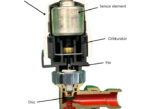
Becoming an energy assessor is a great chance to lead a flexible working life and broaden your skill set. Martyn Reed, Managing Director of Elmhurst Energy, explains more.
Have you ever thought of adding a new skillset or element to your business? As a tradesperson who regularly goes into buildings and may have contacts with landlords and estate agents, becoming an energy assessor may be a logical step. Energy assessors specialise in providing energy assessments and certification for a particular type of building including domestic, non-domestic and public buildings or new builds.
Energy Performance Certificates (EPCs), for instance, are required before any residential building can be sold or let and it is the Energy Assessor who will provide the vital energy calculations for these properties. It is an industry that welcomes people with previous experience in building management, installation or construction work or those involved in selling or letting property. No specific experience is necessary to become an energy assessor – training to become fully qualified is all you need.
There are around 15,000 energy assessors across the country today. It is a flexible, fast-paced job: you can be employed by organisations or work for yourself, supplement your income or build up a new business, work at your leisure (as long as it’s in daylight!) and expand your existing skill set. If you are considering becoming an energy assessor, companies that offer training and support are the place to get started. Elmhurst Energy provides training, accreditation, approved software and support.
Becoming an energy assessor
Step one is to complete a training course. Intensive courses at entry level can be anything from three to five days. Elmhurst offers a series of low cost, entry levels courses that will get you on the road to become an assessor. Our courses include Domestic, Non-Domestic and On Construction Domestic Energy Assessor Training. The training builds skills and knowledge quickly and most trainees will move from the classroom to undertaking practical assessments within days.
Before you can become a qualified energy assessor, you must submit a practical portfolio. Once you are qualified, you can apply to become accredited. Elmhurst offers the UK’s largest accreditation scheme. It gives you access to professional, easy to use online and mobile software, a broad range of CPD courses, including online webinars and regional events, marketing material to help you sell your services, regular industry updates and free CPD hours delivered through technical bulletins, newsletters and networking events.
Get accredited
Your accreditation body must have been approved by the Government to ensure a standard of energy assessment software and practices and is there to ensure you have appropriate knowledge to do the job. It should manage regular CRB checks, build and develop Government approved software that meets the requirements of building regulations, provide training and support and advice. At Elmhurst we also help your business growth by posting work opportunities and running a programme of networking events, provide manuals and technical bulletins to clarify processes and conventions and provide free online and mobile tools to assist you with managing your work and any audits.
Minimum Energy Efficiency Standards (MEES)
This is a busy time for energy assessors and a great time to become one. The government’s introduction of the Minimum Energy Efficiency Standards (MEES) means many landlords and agents are commissioning an Energy Performance Certificate to establish the current rating (which may have changed over time) and find opportunities for improvement.
MEES has been introduced by government to improve the quality of private rented buildings and reduce the UK’s CO2 emissions. Since 1 April 2018, it is unlawful to grant new leases for properties with an Energy Performance Certificate (EPC) rating below an E, with fines of up to £5,000 for those who do not comply. By April 2020, MEES regulation will extend to all existing residential privately rented property and to all existing commercial leases by 2023. There is a possibility this could rise to a D rating by 2025 and a C rating by 2030.
Elmhurst has a number of fact sheets on MEES to help energy assessors encourage landlords get an up-to-date EPC as soon as possible.
Becoming an Energy Assessor can give you a fantastic work-life balance, boost your employment opportunities or give you the chance to create and run your own business. Find the right training, software and accreditation provider and you will be adding a significant business opportunity to your portfolio.
To find out more, visit www.elmhurstenergy.co.uk.












